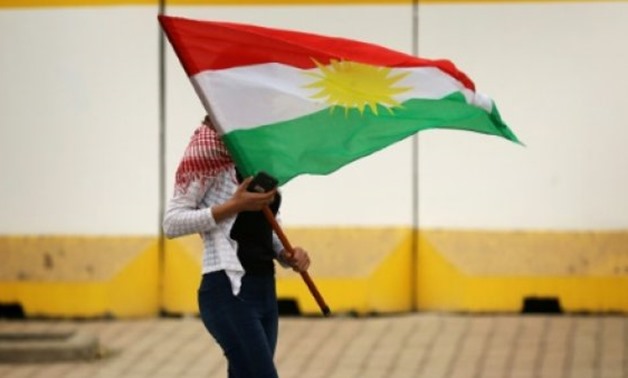
© AFP/File | A women attends a protest in support of the Iraqi Kurdish leader, in Arbil, the capital of autonomous Iraqi Kurdistan, in October 2017
SULAIMANIYAH (IRAQ) - 19 December 2017: Iraqi Kurdistan, mired in deadly protests, has been in open crisis with the Baghdad government since voters in the northern autonomous region overwhelmingly backed independence in a September referendum.
Here are the key developments:
- Millions vote -
Despite weeks of threats and warnings, the non-binding plebiscite goes ahead on September 25 with more than 12,000 polling stations opening for 5.3 million registered voters.
It is held in the three provinces of Iraqi Kurdistan -- Arbil, Sulaimaniyah and Dohuk -- as well as in disputed border areas such as the oil-rich province of Kirkuk.
Baghdad says the vote is "illegal" and the United States warns it will increase instability.
Iraqi Prime Minister Haider al-Abadi on September 26 gives authorities in Kurdistan 72 hours to hand the central government control of airports, warning he will otherwise ban international flights to and from the region.
- A massive 'yes' -
The official results released on September 27 show more than 92 percent of voters back statehood. Turnout is over 72 percent.
Then Kurdish leader Massud Barzani, who initiated the referendum, says there will be no immediate declaration of independence, but calls for negotiations.
Abadi demands that the vote be annulled. "We will never hold talks based on the results of the referendum," he says. "We will impose Iraqi law in the entire region of Kurdistan."
- Flights cut -
Baghdad cuts the Kurdish region's direct air links with the outside world indefinitely on September 29.
The United States says it does not recognise the referendum and its result which "lacks legitimacy".
On September 30 Iran embargoes trade in fuel products with Iraqi Kurdistan.
- Soldiers deployed -
Kurdish peshmerga forces on October 12 block roads from Iraqi Kurdistan to Iraq's second city Mosul in response to an increase in deployments and movements of Iraqi forces near the front line.
Abadi denies an attack is imminent, vowing to "preserve the unity of our country".
But on October 13, the Iraqi army launches an operation to take Kurdish-held positions around the provincial capital of Kirkuk, which has a Kurdish majority and took part in the contested referendum.
On October 15 the Kurds ignore a looming deadline set by Baghdad for their forces to surrender positions they took during the fightback against jihadists.
The following day, Iraqi forces take control of the city of Kirkuk as well as key military sites and an oilfield.
The capture of more key oilfields in the disputed province on October 17 dashes Kurdish hopes of creating a viable independent state. Abadi says the referendum is "a thing of the past".
On October 20 Iraqi forces retake control of the last sector of Kirkuk province.
- Conciliatory signals -
On October 25 Iraqi Kurdish leaders offer to freeze the outcome of the independence vote, but Abadi says he will accept only its reversal.
Barzani tells parliament on October 29 in a letter he is stepping down as president of the autonomous Kurdish region from November 1.
Iraq's supreme court declares the referendum unconstitutional on November 20.
- Protests turn deadly -
On December 18 Kurdish demonstrators attack the headquarters of all five of the region's main political parties, as well as a building of the security services in the province of Sulaimaniyah to protest against corruption and call for the regional government to resign.
On December 19 new protests take place in Iraqi Kurdistan, where demonstrators torch party headquarters.
Five people are killed and nearly 200 injured, according to medical sources, as security forces open fire during clashes.

Comments
Leave a Comment